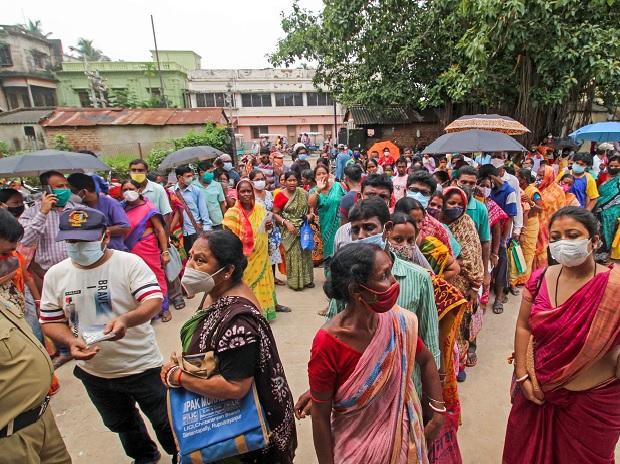Global recovery gap widens on unequal vaccine access, IMF says

The International Monetary Fund maintained its outlook for the biggest rebound in global economic growth in four decades while changing underlying regional forecasts, with unequal access to vaccines further widening the recovery gap between advanced and developing economies.
World output is still expected to grow 6% in 2021 following last year’s 3.2% drop, the fund said in an updated World Economic Outlook released Tuesday. It reduced the forecast for emerging-market expansion to 6.3% compared with the 6.7% increase projected in April, and raised the estimate for advanced economies by 0.5 percentage point to 5.6%.
The U.K. got the biggest bump among major economies, with the IMF now forecasting a growth rate of 7% in 2021, a touch lower than Bank of England estimates.
For 2022, the IMF now sees global growth of 4.9%, up from 4.4%.
“Vaccine access has emerged as the principal fault line along which the global recovery splits into two blocs: those that can look forward to further normalization of activity later this year — almost all advanced economies — and those that will still face resurgent infections and rising Covid death tolls,” the IMF said. “The recovery, however, is not assured even in countries where infections are currently very low so long as the virus circulates elsewhere.”
To address the widening gap, the Washington-based fund urged advanced economies — which have inoculated about 40% of their populations — to share their vaccine surplus with poorer nations.
“Multilateral action is needed to ensure rapid, worldwide access to vaccines, diagnostics, and therapeutics,” IMF Chief Economist Gita Gopinath said in a related blog. “This would save countless lives, prevent new variants from emerging and add trillions of dollars to global economic growth.”
In May, the fund proposed a $50 billion plan to end the pandemic, in which 40% of people in every country would be vaccinated by the end of the year. The World Health Organization, the World Bank and the World Trade Organization all endorsed the proposal.
Among other findings:
-
Emerging Asia saw the biggest downgrade among regions, with the IMF trimming the growth projection for this year by 1.1 percentage points to 7.5%.
-
A 3 percentage-point cut in the annual growth rate for India — hurt by a severe second Covid-19 wave from March to May — led the drop. Despite this, gross domestic product there is set to expand 9.5% in 2021.
-
The forecast for sub-Saharan Africa is unchanged relative to April, with worsening pandemic developments expected to weigh on the region’s recovery. A 0.9 percentage-point increase in South Africa’s forecast offset downward revisions in other countries.
-
The fund raised its GDP expansion outlooks for the U.S., the euro area, Latin America and the Middle East and Central Asia. -
Inflation is expected to return to its pre-pandemic ranges in most countries in 2022 once these disturbances work their way through prices, the fund said. Elevated inflation is also expected in some emerging-market and developing economies, related in part to high food prices.
Risks tilt to the downside, with uncertainty surrounding the global baseline remaining high, the IMF said. Delays in administering vaccines would allow new variants to spread, “with possibly higher risks of breakthrough infections among vaccinated populations.”
“Concerted, well-directed policies can make the difference between a future of durable recoveries for all economies or one with widening fault lines — as many struggle with the health crisis while a handful see conditions normalize, albeit with the constant threat of renewed flare-ups,” the IMF said.
 Dear Reader,
Dear Reader,
Business Standard has always strived hard to provide up-to-date information and commentary on developments that are of interest to you and have wider political and economic implications for the country and the world. Your encouragement and constant feedback on how to improve our offering have only made our resolve and commitment to these ideals stronger. Even during these difficult times arising out of Covid-19, we continue to remain committed to keeping you informed and updated with credible news, authoritative views and incisive commentary on topical issues of relevance.
We, however, have a request.
As we battle the economic impact of the pandemic, we need your support even more, so that we can continue to offer you more quality content. Our subscription model has seen an encouraging response from many of you, who have subscribed to our online content. More subscription to our online content can only help us achieve the goals of offering you even better and more relevant content. We believe in free, fair and credible journalism. Your support through more subscriptions can help us practise the journalism to which we are committed.
Support quality journalism and subscribe to Business Standard.
Digital Editor
business-standard.com

